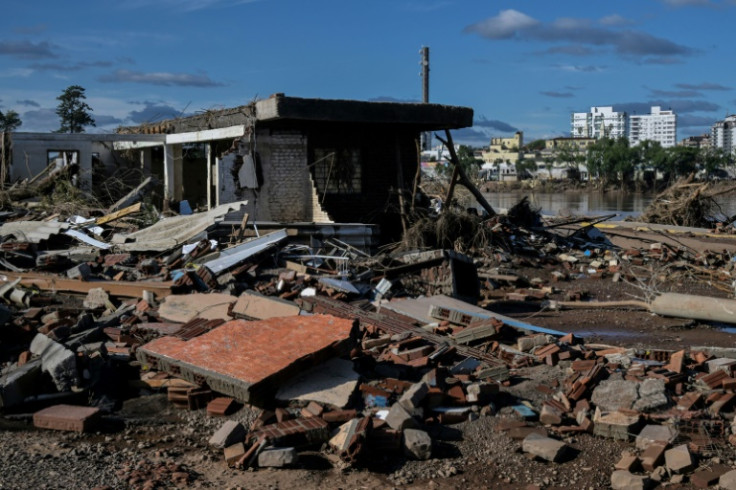
The BRICS group of nations pledged a billion dollars for storm-ravaged southern Brazil Tuesday as slowly receding floodwaters started to reveal the full extent of the devastation.
An unprecedented days-long deluge has claimed at least 149 lives in the stricken Rio Grande do Sul state, with 124 people still missing, according to official data.
More than 600,000 people have had to leave their homes due to flooding in more than 400 cities and towns. Some 80,000 have found refuge in shelters.
The bank of the BRICS -- a group including Brazil, Russia, India, China and South Africa -- said Tuesday it would free the equivalent of more than a billion dollars to help the affected state.
The money will help "rebuild urban and rural infrastructure," New Development Bank chief Dilma Rousseff, a former president of Brazil, said on X.
Tons of donations continued to arrive in Rio Grande do Sul Tuesday, where a massive rescue and humanitarian effort has been underway for nearly two weeks -- the largest logistics operation in the state's history.
Brazil's federal government has also vowed some $10 billion for reconstruction of the area, with roads, bridges, schools and hospitals ruined and thousands of residents relying on handouts for food, drinking water, medicine, clothing and mattresses.
In the municipality of Cruzeiro do Sul, which has about 11,600 inhabitants, the water "passed above the roof of our house," Silvio Kehl, a 40-year-old painter, told AFP.
After experiencing their third flood there, Kehl, his wife and four-month-old daughter are now leaving, "before something worse happens."
Nearby, 61-year-old Nelson Xavier contemplated the ruins of his devastated concrete factory.
"It was 30 years of work, of struggle and now we lost everything," he said.
"I would like to open again and have employees... but it is impossible, I no longer have the strength."
The Guaiba, an estuary bordering the state capital of Porto Alegre which overflows when its level reaches three meters (about 9.8 feet), hit a historic high of 5.3 meters last week, and stood at 5.2 meters Tuesday.
President Luis Inacio Lula da Silva is expected to visit the region Wednesday for the third time.
On Monday, his government sent a proposal to Congress to suspend the state's debt repayments for a period of three years.
The floods are the latest extreme weather event to hit Brazil, following record-breaking forest fires, unprecedented heat waves and drought.
The government and experts have blamed the El Nino weather phenomenon, exacerbated by climate change.
Environment Minister Marina Silva told AFP on Tuesday the tragedy underlined the need to build cities resilient to climate change.
"We will have to adapt because climate change has already arrived... (to) create resilient cities, plans to manage risks and not just disasters," she said.
This could entail relocating communities in areas at risk and planting protective vegetation in flood zones.
Turning to Lula's comments that Brazil was not prepared for the disaster, Silva said: "Brazil is part of the world, which is not prepared.
"For more than 30 years it has been said that the problem is the use of fossil fuel, deforestation. And unfortunately, as humanity we did not do the work" necessary to slow planet-warming greenhouse gas emissions.
Floods have also displaced over 3,000 people in neighboring Uruguay.








